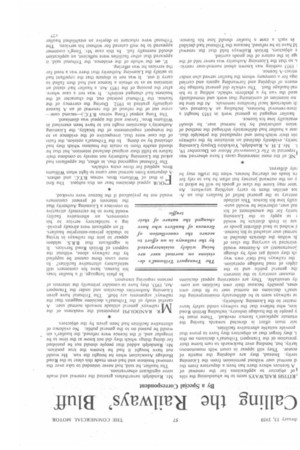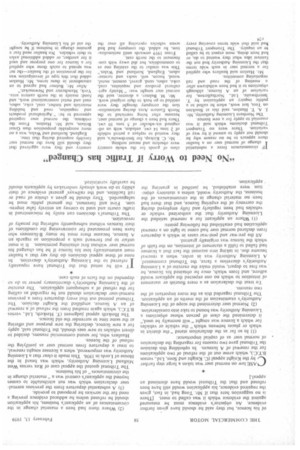Calling the Railways' Bluff
Page 67

Page 68

If you've noticed an error in this article please click here to report it so we can fix it.
By a Special Correspondent
,RITISH RAILWAYS seem to be abandoning the role of objector to applications for the renewal of A licences where there has been a departure from the normal user without permission from the Licensing lority. Instead, they are adopting the mantle of ecutor. They still appear in court with monotonous larity, but, bending over backwards to ram home their .pretation of the Transport Tribunal's decisions on this t, they forget that as objectors they have to prove that provide suitable alternative facilities.
leir main effort is directed towards having the irtunatc applicant's licence revoked. There must be y people in the haulage industry, including British Road ices, who believe that the railways could safely leave matter to the Licensing Authority.
le railways seem to be deliberately misinterpreting the unal's decisions on normal user to fit their own ioses, possibly because their own facilities are corn!ly unsuitable. They are construing appeal decisions manner contrary to the interests the general public and to the ciples of road haulage operation. the railways had their. own way ch they could get only by change .iovernment) an A-licensee would .estricted to carrying the class of Is within the districts detailed in aormal user attached to his licence. ! wished to haul different goods or .ate in fresh districts he would
to apply to the Licensing hority for the amendment of his nal user, otherwise he would autoCally lose his licence. This attitude ontrary to the general belief of hauliers that an Ace entitles them to carry anything anywhere. An -ator may know the class of goods he will be asked to y on the outward journey but often he has to rely for rn loads on clearing houses, when the traffic may be rely different.
,NE of the most interesting cases I have observed was /reported in The Commercial Motor on December 19, I. Mr. J. H. A. Randolph, Yorkshire Deputy Licensing aority, evidently declined an invitation by the railways am n their witch-hunt and repudiated the principle that, use a haulier had deliberately infringed the method of ution authorized by his normal user. he should • matically lose his licence. • haulier engaged in general work in 1953 bought a iture-removal business, including an A-licensed van. 11 undertook local furniture removals. At the time he no intention of continuing that work and immediately aced the van by a platform vehicle. adding it to his ;ral-haulage fleet. The vehicle did general haulage for incern of shipping and forwarding agents and carried ings for a company whom the haulier served also under ntract-A licence.
1953 nothing was known about normal-user restrict, so that the Licensing Authority was never told of the ige in the nature of the goods carried.
s objectors, British Railways held that the renewal Id have to be refused, because the Tribunal had decided in such a case a haulier should lose his licence. Mr. Randolph nevertheless granted the renewal and made some significant observations.
The haulier. he said, had never intended to take over the removal business and had even made this clear to the Road Haulage Association when he bought the van. He would not have bought it had he known the true position. Mr. Randolph added that people should not be punished for doing things which they did not know at the time to be irregular and, if the licence were refused, the haulier's sin would be passed on to the general public. No evidence of alternative facilities had been given by the objectors.
MR. RANDOLPH pinpointed the weakness of the railways' general attitude towards normal user. A careful study of the Tribunal's decisions suggests that the railways' arguments are bluff. The Tribunal have given Licensing Authorities discretion and under the Transport Act, 1953, they have to consider primarily the interests of persons requiring transport.
In plain language, if a haulier loses his licence, have his customers still satisfactory alternative facilities? In most cases these cannot be supplied by the railways alone, without the support of British Road Services. It is significant that B.R.S. seldom appear to join the railways in trying to shackle private-enterprise hauliers.
If an applicant were already providing a satisfactory service to his customers, an alternative facility would have to be extremely attractive to convince a Licensing Authority that would not be the interests of prejudiced if the licence present customers were revoked.
OUR appeal decisions bear on this subject. The first r is that of Williams Bros. versus B.T.C. and others. A departure from normal user came to light when Williams Bros. applied for three extra vehicles.
The Tribunal suggested that, in effect, the appellants had asked the Licensing Authority not merely to condone their failure to fulfil their original declared intention, but that he should enable them to retain the business which they had obtained by so doing. In the Tribunal's opinion, the facts of the case were that, irrespective of the evidence as to the transport requirements of the locality, the Licensing Authority's discretion ought not to have been exercised in Williams Bros.' favour and the appeal was dismissed.
The Tong appeal (Tong versus B.T.C.)—second case— arose out of the refusal of the renewal of an A licence originally granted in 1952. During the currency of the licence, the Tribunal pointed out, the character of the business had changed entirety. It was not a case where. after the passing of the 1953 Act, a haulier had stated an intention so as to obtain a licence and had then failed to carry it out. It was not in dispute that the appellant had to satisfy the Licensing Authority that there was a need for the services he was offering.
If, on the whole of the evidence, the Tribunal said. it appeared that other facilities were sufficient, an application should normally fail. In this case Mr. Tong's customer appeared to be well catered for without his services. The Tribunal were reluctant to deprive an established haulier of his licence, but they said he should have given further evidence. An objector's evidence must be measured against the evidence which it was called to meet. [There is no suggestion here that if Mr. Tong had, in fact, given the required evidence, his application would still have been refused and that the Tribunal would have dismissed an appeal.]
CASE law on normal user was taken a large step farther by the Knight appeal (C. Knight and Sons, Ltd., versus B.T.C.), which arose out of the refusal of two applications for the renewal of A licences. In upholding this decision the Tribunal gave two reasons for regarding the declaration of normal user as of capital importance:
(I) In so far as the declaration stated "the district in which or places between which" the vehicle or vehicles for which a licence was sought "will normally be used," it determined the class of person whose objections a 'Licensing Authority was bound to take into consideration.
(2) Normal user determined the scope of the Licensing Authority's examination of the merits of an application. The Tribunal regarded this as the more important of the two reasons.
To treat the declaration as a mere flourish or statement of intention to which no one expected the applicant would adhere, and from which, once he obtained his licence, he was free to depart, would make the exercise of a Licensing Authority's discretion a farce, the Tribunal commented. A Licensing Authority was in order, when a renewal became due, in taking into account the fact that a licensee had failed to fulfil a statement of intention, on the faith of which the licence was originally granted.
All the pre-war and post-war cases in which a departure from declared normal user had come to light on a renewal application had established the following points: (1) Where an applicant for a renewal satisfied the Licensing Authority that the authorized vehicle or vehicles had been regularly and fully employed during the currency of the expiring licence, and that there had been no material change in the circumstances of the business, the Authority would, unless a statutory objection were established, be justified in granting the ' application. (2) Where there had been a material change in the circumstances of an applicant's business, his application should be refused unless he adduced evidence proving a need for the services he proposed to provide.
(3) A substantial departure from the previous normaluser declaration which was not attributable to causes beyond the applicant's control was a " material change in the circumstances" of his business.
The Tribunal quoted the appeal case of Rex versus West Midland Licensing Authority, which was heard in the House of Lards in 1936. This made it clear that a Licensing Authority was empowered, when a licensee sought. renewal, to treat a departure from normal user as justifying the refusal of the licence.
Hauliers who, for sound commercial reasons, decided to divert vehicles to new uses should, the Tribunal said, apply for a new licence, declaring the new purpose and offering at the same time to surrender the old licence.
The Hesketh appeal judgment (T. Hesketh, Ltd., versus B.T.C.), which again resulted from the refusal of a renewal of an A licence, amplified the Knight decision. The Tribunal pointed out that every departure from a previous normal-user declaration should not be regarded as calling for the refusal of a subsequent application. The exercise of the Licensing Authority's discretionary power to do so depended on the facts of each ease.
I T will be noted that the Tribunal have repeatedly referred to the Licensing Authority's discretion. In none of these appeal decisions do they say that a haulier must automatically lose his licence if he has changed his normal user without first obtaining permission. It is most unfair to put forward such a proposition as regards an A licence, because there must be many B-licensees who have been prosecuted for contravening the conditions of their licences without subsequently suffering the penalty of revocation.
The Tribunal's decisions can easily be misconstrued in traffic courts and used to convey an entirely false impression. First and foremost, the general public must be safeguarded. They should be given a choice of road or rail facilities, and the railways' general evidence of their ability to do work already undertaken by applicants should be carefully scrutinized.
















































































































